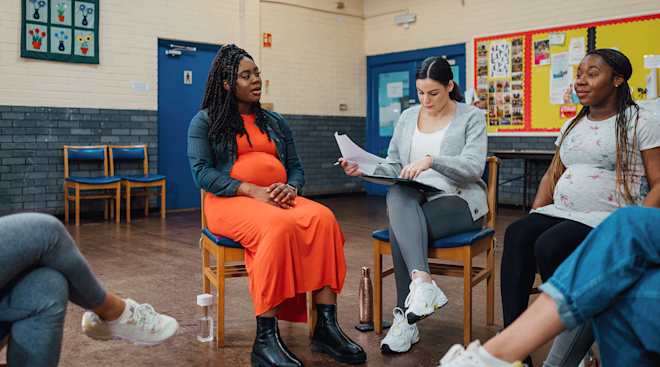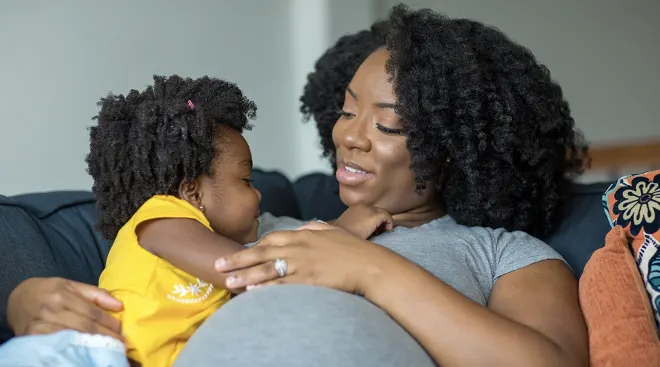How to Assemble an Affirming Prenatal Care Team
Finding prenatal healthcare that’s individualized to your needs can be difficult for anyone. But if you identify as LGTBQ+, finding an inclusive, affirming provider—someone who shows respect for you and your growing family and has knowledge about the physical and mental challenges you face—can feel extra daunting.
Tel Viehmann Cunningfolk, CPM, a licensed and certified professional midwife and owner of Taproot Midwifery in Sacramento, California, notes the gamut of factors that many LGBTQ+ families are up against. For starters, there are the extra hurdles it takes for some to get pregnant, the legal hoops they’ll need to jump through after their baby is born to establish parental rights for each partner, finding a healthcare team that uses appropriate language for pronouns and body parts and, for some transgender parents, locating a provider who knows how to take care of those who have used hormone replacement therapy.
“As a queer parent myself, I have experienced outright discrimination and have had providers who don’t know enough to provide the care I need,” says Viehmann Cunningfolk. “When you’re becoming a parent for the first time, it’s hard enough to think about expanding your family… To also be [under the care of] a provider who is undereducated and biased adds stress that people shouldn’t have to deal with.”
Every pregnant person has the right to quality care and a healthy, happy experience. Below, some expert tips on putting together an affirming and inclusive prenatal team.
For many LGBTQ+ families that are planning a pregnancy, the starting point for finding prenatal care starts with fertility specialists, who can assist you on the path to pregnancy—intrauterine insemination (IUI), in-vitro fertilization (IVF) or reciprocal IVF, where one partner’s eggs are combined with donor sperm and then placed in another partner’s uterus. The best way to find an affirming healthcare provider is to talk to people who’ve been through the process before, says Vicki Bloom, CD, a certified doula and founder of Whole Self Doula near New York City. Talk to your LGTBQ+ family, friends and acquaintances to find out which providers they like and don’t like. “The LGBTQ+ community isn’t shy about telling people when they have a good or bad experience,” says Bloom. Also, if you’re using a fertility specialist to assist with getting pregnant, they can typically refer you to an inclusive ob-gyn or midwife practice, notes Allison Bloom, DO, MPH, a reproductive endocrinologist with Main Line Fertility in Philadelphia. Most importantly, you want to be treated by someone who makes you feel seen and heard, and helps you feel centered during this stressful but exciting time.
If you don’t have any personal recommendations to start with, there are a series of questions you can ask ob-gyns, midwife practices, fertility clinics, birthing centers, etc., says Allison Bloom. Ask if they have LGTBQ+ allies in their practice, she suggests. And inquire if they serve other LGTBQ+ patients and how many. “You don’t want to be the first one,” she says. You can also ask if they’ve gone through any type of competency training on how to provide culturally sensitive care for LGTBQ+ families.
You can tell a lot about how LGTBQ±affirming a provider is by browsing their website, notes Allison Bloom. “I’m an ‘out’ provider, and I share my story, which helps,” she says. Lots of sites will talk about their providers who identify as queer. Some have a Human Rights Campaign or Family Equality designation that marks them as true LGTBQ+ allies, she adds. One of the best ways to gauge a practice’s commitment to serving LGBTQ+ clients is by downloading their medical forms and checking for gender-neutral language. When you see that, “[you] know [you] are supported and are going into an environment where [you’re] welcome,” she says. You can also at the pictures on their site—do they only highlight heterosexual couples? Do your due diligence and a little digging to get the answers you’re looking for. “Anyone can put a rainbow in their window but it doesn’t necessarily mean that they’ve done the training specifically,” says Allison Bloom.
If you’re an applicable candidate for a home birth—you’re healthy and your pregnancy is low-risk—the experience will limit the number of people you’ll have to engage with during labor and delivery, says Viehmann Cunningfolk. “People who hire me know they’re hiring me, and I’m there for all their appointments and birth,” they say. “There will be no extra people in the picture that they have to worry about.”
Wherever you give birth, bringing along a partner, doula or another support person ensures that you have someone to advocate for you. This is especially important if you’re in a traditional hospital setting where you’re much more likely to interact with staff who aren’t used to working with LGTBQ+ people, notes Viehmann Cunningfolk. A doula can help you feel safer and act as an intermediary by ensuring the healthcare provider on duty knows your preferred pronouns and knows who any other parent in the room is. “One thing you don’t want to do when you’re going through this intense experience is LGBTQ+ 101,” says Vicki Bloom. “That’s not what you want to be spending your energy on.”
It’s important to set out your birth expectations and goals and share it with your team. That way, there’s no way for people to be surprised, says Vicki Bloom. Plans might not go exactly as you want, but it’s good to have a framework in place.
Another way to set expectations while giving birth in a hospital is to write pertinent information on your room’s whiteboard, said Vicki Bloom. Write down your pronouns, who your partner or support person is and any other language you’d prefer the doctor or nurses use when they’re with you. This may prevent providers who aren’t as used to working with LGBTQ+ patients from making incorrect assumptions about you and your family.
For non-gestational parents or partners who want to chestfeed the baby, it’s important to leverage your network to find a lactation consultant who knows how to induce lactation in the non-birthing parent, notes Vicki Bloom. Moreover, be clear about your feeding plan from the start so you can get your care team on board and avoid unnecessary or invasive inquiries.
No matter what your gut is telling you, don’t ask your provider outright if they’re LGTBQ+, says Vicki Bloom. “They may be queer and thrilled to be working with a lesbian couple or trans person,” she says. “If they feel like it’s a safe space they’ll tell you.”
About the experts:
Allison Bloom, DO, MPH, is a reproductive endocrinologist with Main Line Fertility in Philadelphia. She received her medical degree from Nova Southeastern University College of Osteopathic Medicine in Fort Lauderdale, Florida.
Vicki Bloom, CD, is a certified doula and founder of Whole Self Doula near New York City.
Tel Viehmann Cunningfolk, CPM, is a licensed and certified professional midwife and owner of Taproot Midwifery in Sacramento, California.
Plus, more from The Bump:
Navigate forward to interact with the calendar and select a date. Press the question mark key to get the keyboard shortcuts for changing dates.




















































